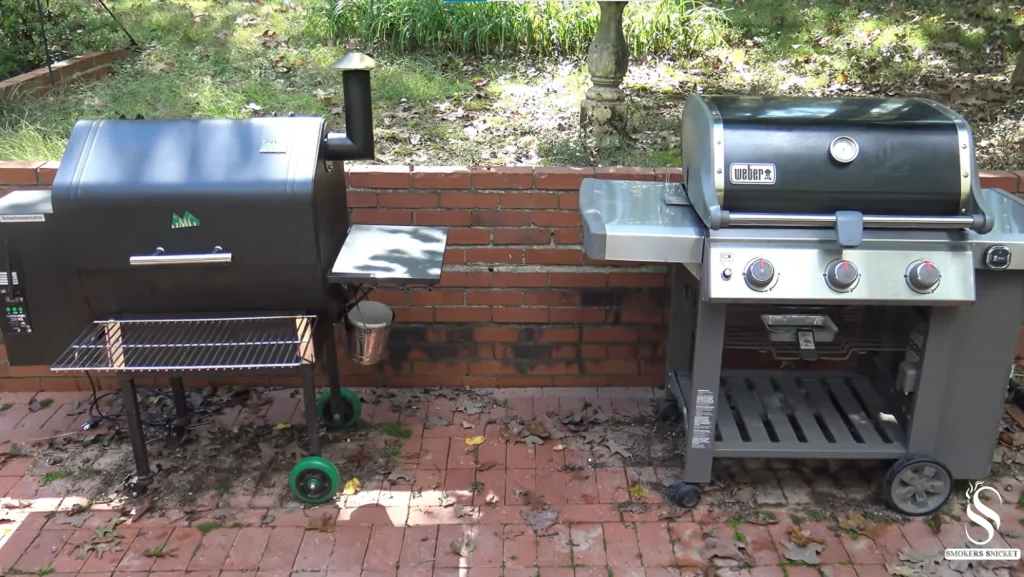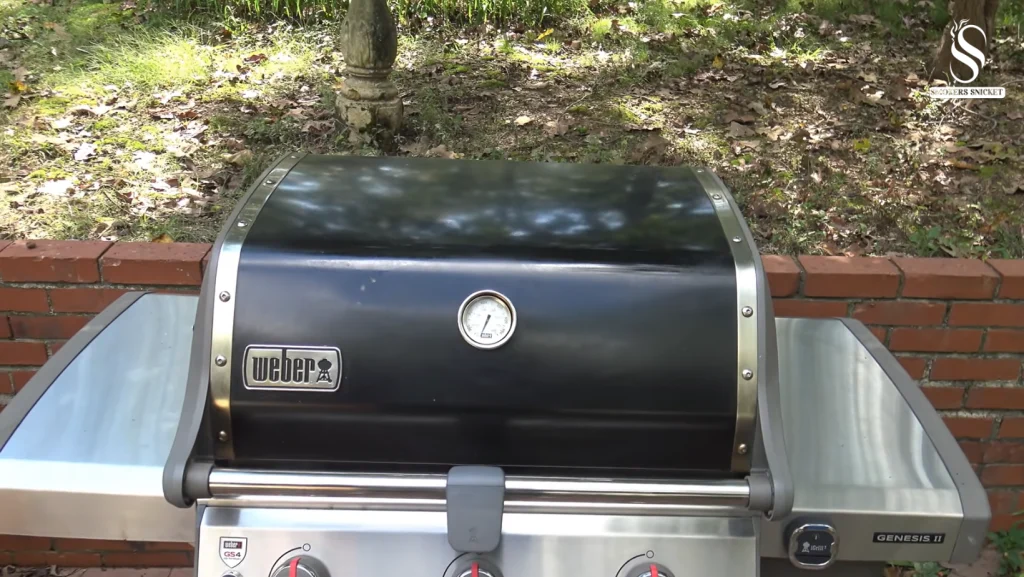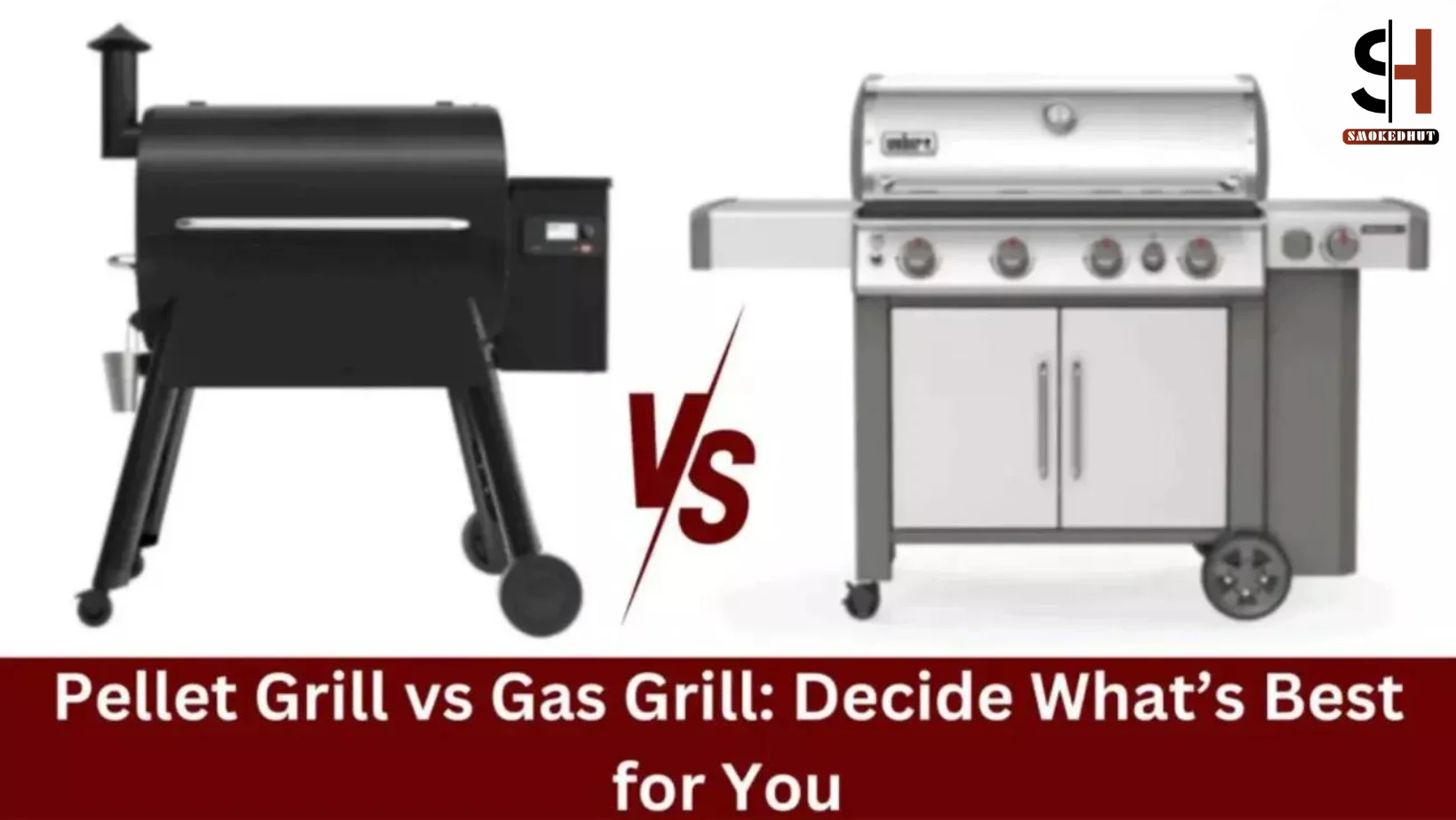Pellet Grill vs Gas Grill: Decide What’s Best for You
As both a professional chef and backyard grilling enthusiast, I get asked constantly which grill potential buyers should purchase. Should they invest in a pellet grill or gas grill?
They’re curious whether those buzzworthy pellet smokers are worth ditching the convenience of gas.
While the answer depends largely on your budget, grilling habits and personal preferences. There are key differences between these two BBQ appliance categories that any discerning purchaser should carefully weigh.
As someone who owns (and loves) both types of smokers and grills, I’ll cover all the major points of comparison. Shoppers should consider from build to heat output to flavor and beyond. Hopefully by the end, you’ll have clear guidance on deciding between pellet grill vs gas grill for your ideal barbecue partner.
Overview of Pellet Grills and Gas Grills
For those unfamiliar with either appliance, here’s a quick look at how each functions:

Wood Pellet Grills
- Burn small hardwood pellets in a combustion chamber
- Heat and smoke diffused into main chamber
- Electronic control panel regulates temperature
- Convection fan circulates heat
- Flavor from wood smoke integrated into foods
Propane Gas Grills
- Burn liquid propane (or natural gas) flame
- Direct heat across grates above flames
- Heat controlled via gas flow valves
- Air circulation via hood vents
- Flavor from food drippings, wood chips
In basic design and heat production they operate very differently. And that translates to differences in performance capabilities.
Grill Construction and Build Quality
Commercial grade stainless steel constitutes the best material for heavy duty grilling appliances. Options like porcelain enameled steel also hold up well to outdoor conditions. Cheaper grills may corrode after a few seasons.
Here’s some additional detail I can add to expand on the pellet grill vs gas grill comparison:
Best vertical Pellet smokers contain more moving parts like the auger, hopper, grease management and interior diffuser that require sturdy fabrication to hold up over years of use. Entry-level pellet grills can suffer issues like broken augers or faulty controllers if not properly engineered.
High end gas grills may incorporate commercial-grade stainless steel burners, flavorizer bars and cooking grids for optimal durability and heat distribution. Budget gas grills more commonly use coated steel or cast aluminum on their burners and inferior metal grades overall.
Comparing grill lid design is also telling – double-walled stainless lids provide better insulation to hold in heat and moisture on pellet and gas models alike. And strong welds and hinges that don’t warp or rust make opening/closing smoother long-term.
Pellet Grills
- Heavy-gauge steel components common
- Porcelain surfaces help resist rust
- Lots of interior moving parts

Gas Grills
- Stainless or coated metal construction
- Simpler internal design
- Propane tank enclosure important
I always inspect welds, hardware, lid seals and overall sturdiness in person before purchasing. All grills eventually require replacing parts like heat shields, but quality materials withstand the elements better. Higher budgets afford thicker grades of metal and more attention to weather resistance.
Additional read: Charcoal Vs. Pellet Smoker
Temperature Regulation and Heat Production
What I have noticed is; the main limitation of gas grills is they only reach 500-700°F on max burn. Pellet grills claim vastly greater temperature range and precision. How do they really compare?
Direct vs Indirect Heating Benefits:
Gas grills shine by concentrating intense direct heat from the burners upwards while still allowing grease to vaporize and impart flavor. The highest BTU gas grills caramelize the meat surface better. And multiple independently controlled burners provide more precise temperature zones.
The indirect heat diffused from a pellet grill’s fire pit throughout the cooking chamber enables expert-level smoking without needing to constantly spritz or wrap meat to prevent drying out. Pellet grills essentially bake food gently in wood-scented convection heat rather than aggressively grilling via direct exposure.
Pellet Grill Temp Range
- Low setting = 180° – 225°F
- High setting = up to 500-700°F +
- Precise 5-10° increments
Gas Grill Temps
- Low – can struggle below 225°F
- High – up to 550°F max
- Less precise heat controls

Not only can pellet smokers achieve a rare temperature from 180-125°F, they excel at ultra low and slow smoking thanks to convection fans circulating the heat. Gas grills lean towards hot/fast grilling or roasting.
Flavor Quality from Different Fuel Sources
Here’s where subjectivity enters the equation.
Gas purists insist on bold unadulterated flavor from the meat drippings. Pellet enthusiasts tout the sweet, smoky essence imbued by scented wood pellets. Which tastes better?
Seasoning/marinating has more impact on flavor than anything. But the fuel subtleties can make a difference:
Pellet Grill Wood Fire Flavors
- Alder – sweet, delicate
- Maple – mildly smoky, sweet
- Cherry – mild fruit wood zing
- Hickory – quintessential bold bacon-esque
- Mesquite – intense smoky flavor
Propane Gas Grills
- No wood flavors
- Meat juices and sauce provide flavor
- Various wood chips can be added
My best suggestion? Taste test foods from each before deciding which you prefer. You can always retrofit a propane grill with a smoke tube to approximate pellet grill flavors. There’s no perfectly replicating pure live-fire cooking however.
Grilling, Smoking and BBQ Capabilities
While pellet grills boast vastly greater versatility, don’t underestimate a good gas grill. Here’s how they stack up for key tasks:
Comparing Versatility for Large Cooks:
Gas grills start to max out on capacity for larger roasts, whole birds, or smoking multiple beef shoulders simultaneously. The enclosed chamber design of pellet smokers accommodates bigger cooks much more comfortably. Especially important for major holidays like Thanksgiving or when tackling monster cuts of meat.
And pellet grills increasingly offer clever workarounds that allow both low/slow smoking and high-heat searing capabilities. Some allow direct access to the firepot for steak-worthy heat. While multi-tier designs or grill inserts let traditional grilling happen concurrently with smoking.
Pellet Grills
- Low and slow smoking
- High heat grilling
- Pizza, baking, roasting
- Precise temperature control

Gas Grills
- Searing steaks
- Charbroiling burgers
- Quick weeknight BBQ
- Rotisserie chicken
Yes pellet grills can produce crispy chicken skin, wood fired pizza and golden brisket. But gas grills still excel at tasks benefiting from instant maximum heat like steakhouse quality sear marks.
Additional Pellet Grill Benefits
- Increased convection = juicier meats
- Large temp range = 1 appliance for everything
- More versatile live-fire flavors
- Multi-stage controller means truly “set and forget”
Additional Gas Grill Benefits
- No learning curve required
- Quick startups to feed sudden BBQ cravings
- Portable sizes for camping adventures
- Independent burners provide more direct zone control
For rookie grillers I actually recommend starting with gas for its simplicity then considering a pellet grill upgrade down the road. The transition is easier than the reverse.
Efficiency, Convenience and Maintenance
Pellet grills promise exponentially improved efficiency and convection heat utility over old school barrel smokers. But best propane smokers still hold a convenience edge.
Pellet Grill Efficiency
- Extremely effective convection circulation
- Improved pellet burn pot design = less waste
- Insulated builds require less fuel input
- Temperature changes require manual auger adjustments
- Frequent cleanings to prevent flare ups
- Requires sheltered storage area
Gas Grill Convenience
- Push button instant ignition
- Rapid preheating
- No warmup or cooldown necessary
- Portable sizes with small LP tanks
- Simple ash sweeps for cleaning
- Less efficient heating than convection
- Higher operating costs over time
- Small tank refills annoying
If you despise any startup delay or hassle, pellet operation may frustrate. Lighting a gas grill by simply flipping a switch proves undeniably easier despite having to keep propane stocked.

Ongoing Care and Upkeep
How to clean smoker grill is a serious question! You need tips and hacks for cleaning. For now, here in this comparison:
Pellet Grills: frequent interior clears of ash buildup; burn pot cleanings, hopper refills
Gas Grills: exterior wipe downs, occasional deep cleaning neglectable
Pellet grill maintenance is quick yet mandatory for optimal performance. Gas grills need little fussing besides hose/regulator replacements down the road.
Important Features To Compare
Assessing specs like cooking area, construction gauges, warranties etc helps determine long term value:
Pellet Grills
- Average range ~500-700 sq inches
- Heavy gauge steel components
- 2-3 year comprehensive warranties
Gas Grills
- Average range ~300-600 sq inches
- Thinner metal gauges
- 1 year limited warranty averages
Obviously maximizing cooking capacity hugely benefits entertaining large groups. I watch for strong warranties backing up durability claims as well.
Here are key extras to consider:
Pellet Grill Features
- Hopper Capacity ~10-20 lbs
- Digital Interface Convenience
- Meat Probe Thermometers
- Side Shelves and Storage
Propane Gas Grill Features
- Side Burners
- Rotisserie Accessories
- Sear Burners
- Interior Lights
- Removable Grates
While pellet controllers largely synchronize outcomes, nice modern touches enhance user satisfaction. And extras like infrared burners help gas models compete on features.
Shoppers overwhelmed by specifications can simplify priorities around their aspirational grilling lifestyles. Determining must-have functionality and nice-to-have bonuses guides sensible decision making.
The Verdict: Pellet Grill vs Gas Grill?
Before tallying any final verdict, remember that investing in quality always serves best. While affordable grills tempt with shiny facades, superb construction guarantees lifelong returns.
Now for the tiebreaker decision…**drumroll**…I recommend pellet grills for:
- Set it and literally forget it smoking
- Infusing live-fire flavor into large BBQ menus
- Precision cooking capabilities
- Versatility meeting every cooking need
I recommend propane gas grills for:
- Quick convenience and ease
- Mid-week grilling for smaller groups
- Maximizing sear heat
- Travel and trips to the lake
Whichever you choose, embracing your new grill’s strengths produces the happiest results. Just beware falling into the eventual 2nd backyard grill syndrome plaguing so many enthusiasts! Once the barbecue bug bites, these cravings can rarely be sated by just one appliance.
For further guidance on purchasing choices or grill comparisons, head up to my other articles! I’m always thrilled to write for fellow food fanatics to find their perfect backyard grilling soulmate.
Happy Grilling!

